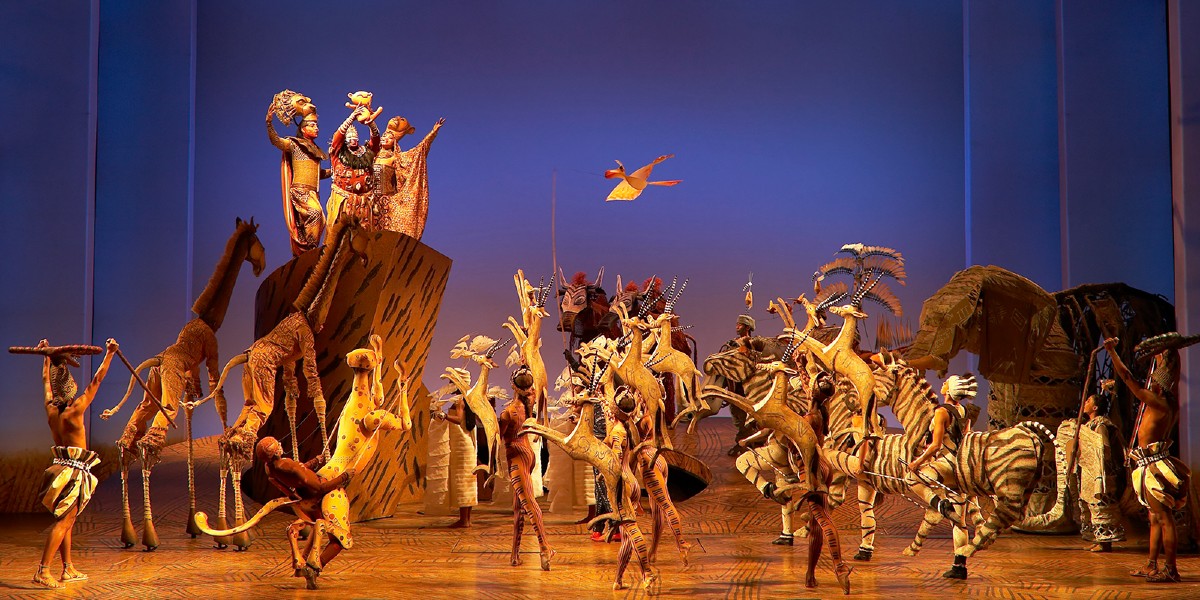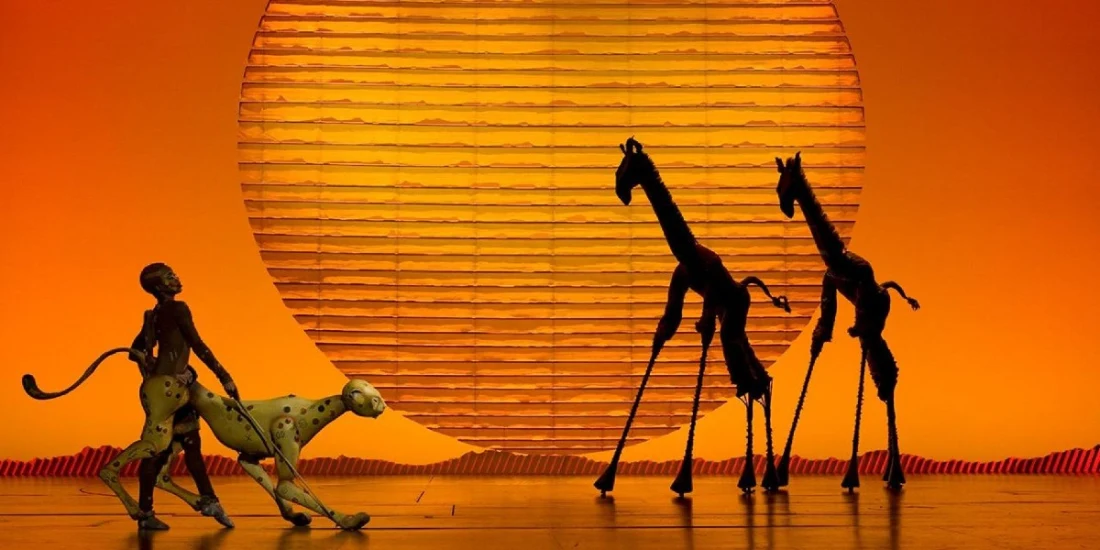All the songs in 'The Lion King' on Broadway
Be prepared to see the modern classic musical by learning all about its music.
Since The Lion King movie came out in 1994, and the Broadway musical three years later, people who grew up the tale of a young lion cub's journey to kingship have since introduced their own children to the story. As the famous opening number of the musical goes, that's the circle of life.
The Lion King's music — penned by Elton John, Tim Rice, and more — has proven especially timeless. All the hit songs from the film — like "Circle of Life" and "Can You Feel the Love Tonight" — remain in the musical, with plenty of new additions. Multiple songs feature lyrics sung partly or entirely in African languages like Swahili and Zulu, a nod to the cultural traditions from which the story draws.
Learn more about all the songs in The Lion King, including fun facts about the fan-favorite tunes and the meanings behind the African lyrics.
Get The Lion King tickets now.

"Circle of Life"
This opening number is recognizable from its first notes. "Circle of Life" takes place as King Mufasa and Queen Sarabi welcome their new cub, Simba. All the animals of the Pride Lands — giraffes, antelopes, zebras, elephants, birds — gather in front of Pride Rock to witness the historic moment. On the Broadway stage, intricate life-size puppetry makes this number especially wondrous to watch.
The song's most famous portion is its opening chant: "Nants ingonyama bagithi baba, sithi uhm ingonyama." These lyrics are in the African language Zulu, and they roughly translate to, "Here comes a lion, father. Oh yes, it’s a lion."
"Grasslands Chant"
The Lion King's action kicks off in earnest once Simba has grown up a little bit. "Grasslands Chant" underscores his transition from infancy to childhood. This song's lyrics are also in Zulu, and they foreshadow Simba's future as king. Phrases like "busa ngo thando bo, busa lomhlaba" translate to "rule with love, rule the Earth."
"The Lioness Hunt"
The title of this song, another Zulu chant, says it all. As a group of lionesses go out to hunt, they chant lyrics that translate to, "We, father, are going to hunt, father." Two of those lionesses are Sarabi and Sarafina, the mother of Simba's best friend, Nala. While their moms are away, Simba and Nala see an opportunity to explore the forbidden parts of the Pride Lands.
"I Just Can't Wait to Be King"
On their journey, Simba boasts to Nala about growing up and ruling the land someday — with no one to tell him what to do. The song includes a few lion puns like, "I'm gonna be the 'mane' event like no king was before!"
"I Just Can't Wait to Be King" is a classic "I want" number, a common song type in musical theatre where a main character sings about their main goal in the story.

"Chow Down"
Simba and Nala find out the hard way why certain lands are forbidden. The pair comes face-to-face with hungry hyenas Shenzi, Banzai, and Ed, but luckily, Mufasa rescues the cubs before they get eaten.
"They Live in You"
In this song, Mufasa teaches Simba a lesson about obedience and discipline, reminding his son he needs these virtues to be a good king someday. He tells Simba that all the kings of the past are watching over him from the stars to provide guidance and strength.
During this song, Mufasa takes off the mask he's wearing and lays down his weapons to emphasize that he's not acting as a king in that moment, but as a father giving heartfelt advice to his son. This song's title parallels that of a later song with a similar theme, "He Lives in You."
"Be Prepared"
"Be Prepared" is one of the most beloved Disney villain songs in history, so naturally, it becomes a major number in the musical. This is the first major scene the audience spends with Scar, who raises an army of hyenas to help him usurp the throne from his brother.
"I'll be king undisputed, respected, saluted, and seen for the wonder I am," Scar sings. "Yes, my teeth and ambitions are bared — be prepared!"
"The Stampede"
This song is another Zulu chant, whose lyrics loosely translate to "Here it comes!" over and over again. The "it" in question is wildebeest as they stampede. Only the final line of the song is different: "Baba, wa mi baba wa mi baba wam," which means, "Father, oh my father!"
"Rafiki Mourns"
Scar kills Mufasa in the stampede, and Rafiki sings a mournful chant in the aftermath. In Zulu, she swears to avenge the king's death and affirms that peace and prosperity will still reign supreme in the Pride Lands.

"Hakuna Matata"
Devastated by Mufasa's death — and convinced he is to blame — Simba runs away from the Pride Lands. In the desert, he meets Timon the meerkat and Pumbaa the warthog, who teach Simba their motto: "Hakuna matata." "It means no worries for the rest of your days," they sing. "It's our problem-free philosophy!"
"Hakuna matata" is a Swahili phrase that literally translates to "no trouble."
"One by One"
The opening song of Act 2 is best experienced live. As the song progresses, puppets of colorful, lively birds give way to vultures and animal skeletons, showing the misery Scar's rule has brought the kingdom.
The animals sing a song of weariness and hope for better days. The Zulu lyrics "ibabeni njalo bakithi, ninga dinwa, ninga phelelwa nga mandla" translate to, "Hold on tight, my people. Don’t get weary; don’t lose your strength."
"The Madness of King Scar"
Scar hasn't fulfilled any of his promises, letting his subjects go hungry and letting the Pride Lands fall into a drought. Yet, he wonders why no one respects him as a ruler. "The Madness of King Scar" shows him rapidly shift between arrogance that he'll save the kingdom and paranoia that he'll lose everything.
"Shadowland"
When Simba left the Pride Lands, he left Nala alone, but she never stopped fighting for her friend. She finally decides to find Simba once and for all and bring him home. Nala and the lionesses sing this song, half in English and half in Zulu, to mourn the current, dark state of the Pride Lands and wish Nala success.
"I cannot stay here, my family, but I'll remember my pride," she says. "Pride" has a double meaning, referring to the pride of lions that is her family, and her own pride and respect for her kingdom.

"Endless Night"
Simba sings this ballad under a starry sky. He feels lost, alone, and abandoned by his father, who once told him he'd always be watching from the stars. "I dream of the day when you were by my side, guiding my path," Simba sings. "Father, I can't find the way."
"Endless Night" is exclusive to the Lion King Broadway show, but its melody is taken from "Lala," a song on the Lion King film's companion album Rhythm of the Pride Lands.
"Can You Feel the Love Tonight"
This song underscores Simba's happy reunion with Nala, who reignites the connection between them and urges Simba to return to the Pride Lands. The song is also a bittersweet one for Timon and Pumbaa, as they realize Simba must leave them and their carefree lifestyle to return where he belongs.
"Can You Feel the Love Tonight" is famous as a pop song in its own right, charting in both the U.K. and U.S. In 1995, the tune won an Oscar for Best Original Song, and John won the Grammy for Grammy Award for Best Male Pop Vocal Performance. He certainly felt the love!
"He Lives in You"
Despite Nala's insistence, Simba is reluctant to go back to the Pride Lands, as he believes himself responsible for his father's death and is therefore unworthy of the throne. In this inspiring, touching song, Rafiki reminds Simba that his father lives on in spirit. Sure enough, Mufasa appears in the stars and seconds Rafiki's statement, telling Simba to pursue his rightful destiny as king.

"Simba Confronts Scar"
This song underscores the climactic battle for the throne between Simba and Scar. "Simba Confronts Scar" is an instrumental tune, but while the music plays, Simba battles his uncle for control and forces him to admit he murdered Mufasa.
"King of Pride Rock/Circle of Life (Reprise)"
With Simba triumphant, order and light return to the Pride Lands. All the animals join in a final reprise of the opening track in which Simba and Nala present their own newborn cub. The ending scene parallels the opening scene, showing that the Circle of Life is back in balance.
"The Morning Report"
Audiences who saw The Lion King early in its Broadway run might remember "The Morning Report," in which Zazu delivers Mufasa his daily briefing on the state of his kingdom. In 2010, the song was cut from the show, but you can still listen to it on the original cast recording.
Get The Lion King tickets now.
Photo credit: The Lion King on Broadway. (Photos by Joan Marcus and Matthew Murphy)
Originally published on
